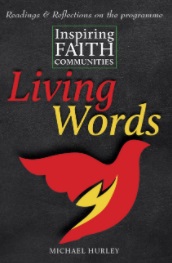 In the wake of good news from Dublin of the potential of family-led preparation of children for early sacraments we hear also that parents are especially committed to family and deeply appreciative of the welcome given to them by parishes in this new model.
In the wake of good news from Dublin of the potential of family-led preparation of children for early sacraments we hear also that parents are especially committed to family and deeply appreciative of the welcome given to them by parishes in this new model.
They are themselves finding the sacred space of the chapel a new place to go, a warm place that often previously they had not felt completely accepted in.
However, other things that happen there – and especially the Mass – are often still obscure. So what’s that all about?
That is exactly the kind of question that adult faith formation should set out to answer – and Fr Michael Hurley‘s latest venture could be just what parish workers and pastors – and these awakened families – need to address it.
‘Inspiring Faith Communities’ sets out to do exactly what parishes need to do to develop the new family-led model – to explain why the early church grew so rapidly as a ‘house church’, building local community in a neighbourhood model of home prayer and mutual family support, endlessly exploring the mysteries and beauties of the Gospel.
That adult faith formation is a long neglected need, and especially needed as children grow into adolescence, has long been understood. That it might be best served not by exploiting the Catechism or pursuing new trends in theology but by ongoing family prayer and scriptural reflection and discussion – to equip parents to deal with the issues and questions of their own children as they grow – is now something that comes into view with the breakthrough for early sacraments in Dublin..
Adults are never more interested in the most important questions than when they become concerned for their children and wonder how to help them cope with everything from school to social media to social disaster.
Why are we here? What on earth is going on? What are bullying and trolling all about? How are we to stay focused and safe – and calm in times like these? Is this the end of things, or just a deep learning opportunity? Is death the end, after all – say the death of a cousin or grandparent – and must we tell the children just to get used to that – or might this just be another roller coaster time, an endless slog to the top of the ascent – before we turn the very top and see just where the plunge will take us?
Might the prophets of doom be utterly wrong after all, and ‘passing away’? And might the many obituaries of God have been, like that of Mark Twain, premature?
I am especially impressed by Michael Hurley’s handling of the truly big questions – for example ‘original sin’ and why we must not see the cross as an accusation designed to make anyone feel guilty.
‘Suspicion’ was our original problem, he suggests – a problem that comes with being conscious of our own littleness in a mysterious everything, and doubtful of our own ability to cope with it. We doubt our own importance just as we are, and are open to the suggestion that we need to be much more than we are. We doubt also our own value as we are, and are far too likely to accept the judgement of others on that question.
The Chapter ‘Why Did Jesus Come?‘ gets to the heart of that. “Jesus turned his back on popularity, power and possessions.”
Could there be a more succinct summary of the problems faced by children as they become aware of a world in which – if you believe the worst of the media – you are a ‘Loser‘ if you are not an ‘Icon’ – and ‘going viral‘ is always the issue?
A world that was never more troubled and threatened by that very mistake?
 Finally, to help family cell groups realise the importance of the ever-presence of the defender and lawyer for the defence – the Holy Spirit – as ever-present adviser and companion on our life’s journey, Inspiring Faith Communities is accompanied by Living Words, a short booklet of scripture passages and reflections that will assist the understanding of ‘renewal in the Holy Spirit’. This, we learn, has less to do with sensations like ‘speaking in tongues’ than with the need of so many for ‘restoration of soul’ – at a time when media pundits revel in language such as ‘his life was ruined by x or y or z’ or ‘depression has become a global plague’ or ‘addiction is rampant’.
Finally, to help family cell groups realise the importance of the ever-presence of the defender and lawyer for the defence – the Holy Spirit – as ever-present adviser and companion on our life’s journey, Inspiring Faith Communities is accompanied by Living Words, a short booklet of scripture passages and reflections that will assist the understanding of ‘renewal in the Holy Spirit’. This, we learn, has less to do with sensations like ‘speaking in tongues’ than with the need of so many for ‘restoration of soul’ – at a time when media pundits revel in language such as ‘his life was ruined by x or y or z’ or ‘depression has become a global plague’ or ‘addiction is rampant’.

Fr Michael Hurley
That ‘ruination’ might instead just be the experience we have needed to become the hero or heroine we can now become – a truly badass assault course designed to make us fit to rescue others ‘ruined’ in the same way – is very well explained by this short book – to astonish us with the news that we have never been forgotten or unimportant or unloved, and neither has anyone else.
What more could be needed to explain to a child approaching Confirmation what a ‘Temple of the Holy Spirit‘ might be?
‘Just in Time’ is my title, and my conclusion. Over to pastors, parish workers and families – and the Holy Spirit.
Sean O’Conaill, 13th November, 2020

Well argued Sean. I agree with every word. It is a successful conclusion to all you and I have written on this topic. It is now over to the bishops and Vatican to respond, a very big ask!